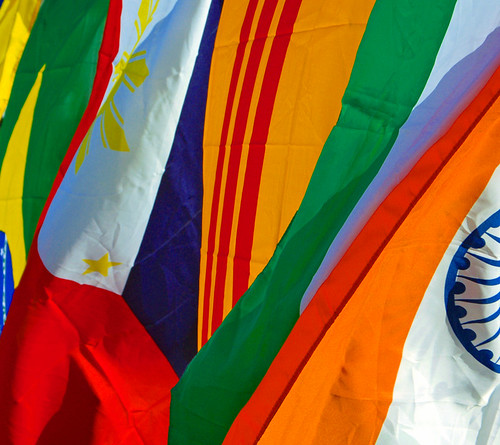 So this blog will combine some elements of New England Albertson news (purpose of the blog) with some of my recent thoughts on things (a vowed non-purpose), so bear with me...
So this blog will combine some elements of New England Albertson news (purpose of the blog) with some of my recent thoughts on things (a vowed non-purpose), so bear with me...While in Portland, OR (you need to specify Portland's last name around here) and attending Bible college, there was much talk about the need to remain (multi-)culturally aware. It became very much aware to me that the Kingdom is many-colored and that this is not accidental on God's part, but indeed reflects his own many-colored nature (or, more accurately, hypostasis) and creative breath. The more this reality became apart of my thinking, the more I desired to be part of a multi-cultural community with diverse voices and perspectives on God's multi-faceted essence.
Boston is said to be one of the most diverse cities in the United States. This was exciting for me when we decided to move to the area... but I quickly realized upon arrival that we are a little ways out of the city. Sarah gets to travel everyday to the very center of this unique city, while I remain cooped up in North Shore, a very different setting indeed. However, even remaining on this campus most of the time in a given week, I still get to interact with various ethnicities: Korean (especially), African, Brazilian, Haitian, Ukrainian, and so forth.
You see, in my beginning years at Multnomah, I was blessed enough to have a class with the notorious Domani Pothen. She had the unique skill of inviting, nay demanding, classroom engagement while sustaining an atmosphere whereby comments were heard and appreciated even if engagement sometimes necessitated constructive criticism. I am reserved by nature (which may be shocking for some), and her class was pivotal for allowing me to be more engaging in the college classroom.
In the graduate classroom, I am learning to temper and make humble my classroom voice. In my class with Linda Cannell, the multi-cultural atmosphere is not only noticed, it is utilized for further learning. I realized quickly, in a class with many Korean students, some of whom are first-generation, I mustn't be so ready to give my opinion. White males, in a global comparison, will typically have larger mouths than ears. And so, I'm finding in my touting of multi-cultural settings that I need to be more and more quiet -- and it's harder than I first thought it would be. Americans need to be okay with silence and even (what may be perceived as) awkwardness. Silence is a lost teacher in the states, and I am a stubborn student.
For further, better articulated thoughts on the Western Church's need for cultural awareness, please listen to this half hour-ish sermon from a Kenyan who spoke on our campus. It changed my life.

No comments:
Post a Comment